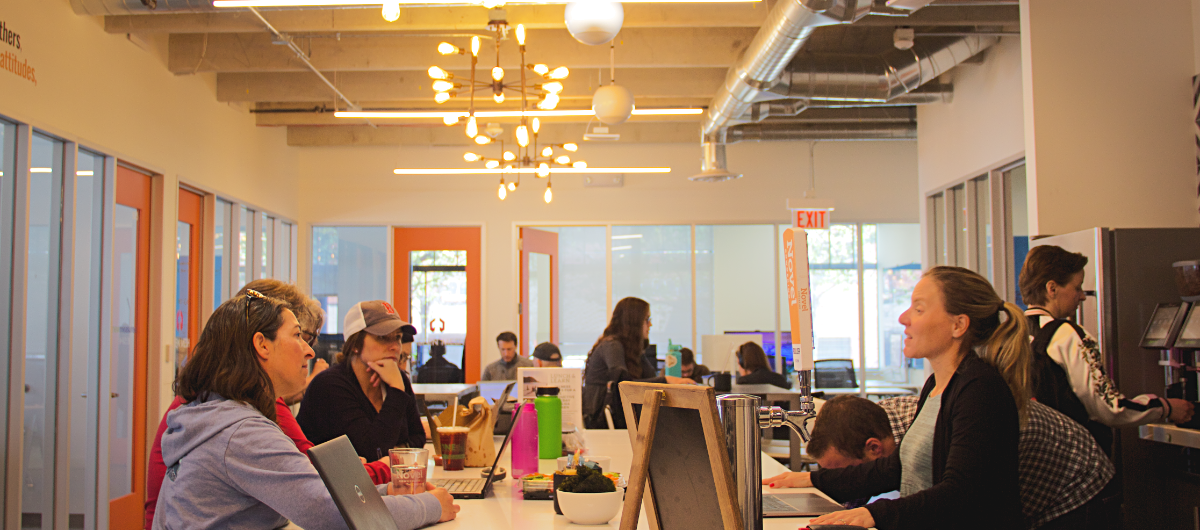Coworking spaces in the USA are white
The ethnicity of members is not very meaningful when making a comparison on a global level. After all, you would expect “Asians” to dominate in Asia and “Caucasians” to dominate in Europe. On the other hand, there are often not enough respondents for small-scale comparisons*.
However, in recent years there have been several requests from the USA to include the question in the Global Coworking Survey, which is why members in this region were asked about their ethnic identity for the first time in the 2019 survey.
Compared to the total population,“White or Caucasian” members clearly dominated coworking spaces in the USA. At almost 90%**, their share was so high that a statistical comparison with other ethnic groups regarding other characteristics was not possible. At over 5%, “Asians” were proportionately representative to the general population. “Hispanics or Latinos” and “Black and African Americans” were generally very underrepresented in coworking spaces***.
Coworking is not a unique selling point of big cities
Compared to the last survey, slightly more members (56%) used coworking spaces outside of megacities. On average over the last few years, however, medium-sized cities have tended to lose shares whereas small towns and villages have seen rises.
The following must be observed: The distribution of members does not correspond to the distribution of coworking spaces. This would only be true if each coworking space had the same number of members, which is not the case. In large cities, coworking spaces serve significantly more members per location on average compared to smaller towns.
Coworking Spaces reflect inequality in society
Women continued to earn a lower income**** than men in coworking spaces. Similarly, self-employed people tended to earn less than employees or employers. Members who worked in megacities had the best salaries. However, private spending was also likely to be higher in such places than in smaller towns.
The share of “digital nomads” remained stable at 14%
On average, users and members of coworking spaces worked abroad for two weeks per year*****. Excluding the members who did not work abroad at all, the average for the remaining members was two months per year.
14% of all members described themselves as digital nomads. 6% also worked abroad for at least four weeks during the year but would not use this description. The vast majority did not exceed the four-week threshold (77%) and, hence, did not classify as digital nomads.
Whether digital nomad or not, members who spent a lot of time abroad earned a higher average income than other members – in relation to the general cost of living in the country of work when they had been surveyed****. Whether they worked in a country different to their nationality had little impact on the outcome.
Get the most important graphics with just one click
An overview of the general results has again been packed into a free slide deck. The detailed results with more comparison groups can be found here.
:::
The 2019 Global Coworking Survey is officially supported by the following organizations:
Main Supporters:
Nexudus Spaces - a management tool for coworking spaces
Essensys - a management tool for coworking spacess
Yardi - a management tool for coworking spaces
Distribution partners:
CoworkingResources - a consultancy tool for coworking spaces
Included.co - a platform to provide business-boosting perks to coworking spaces & their members
IndyHall - a coworking space in Philadelphia
Regional partners:
GCUC North America, Coworking Europe Europe
CUASIA Asia, Qdesq India
Coworking Content North America, Cobot worldwide
Official Supporters:
Coworking Switzerland,
German Coworking Federation,
Sneed India, TopCoworks India,
Office RnD UK/USA/Bulgaria/New Zealand,
No Office Work Portugal, Kisi USA/Germany,
ImpactHub Taipei, Pickspace Israel
SpaceCubed Australia, LeadSpace Nigeria,
AgoraRDM USA, Coworking Croatia
Satellite DeskWorks USA, Hubud Indonesia,
St. Oberholz Germany, Amp Canada
Wexelwirken Germany, WellCoworking Italy
GorillaSpace Singapore, LottoCinque Italy
Coworking Frauenfeld Switzerland,
Coworking Library Germany/USA,
Business Link Poland.
This article took into account data from 879 members and users of coworking spaces. The last detailed evaluation of the membership data took place in 2017. Overall, 2668 people participated in the 2019 Global Coworking Survey. Read here more about the survey.
:::
Footnotes:
* Furthermore, an ethnic group can be misunderstood as“race”, even though human races do not exist from a scientific perspective. The concept of ethnicity is also ambiguous and rather controversial. For these reasons, the question has thus far been omitted.
** Members were able to indicate more than one ethnicity in the survey if they identified as more than one.“Not specified” was not taken into account if no ethnic identity was chosen at all and “Other” was not chosen either.
*** As already mentioned, smaller-scale analyses e.g. by *specific* states or cities such as ‘North Carolina’ or Dallas’, were not possible.
**** Question: “How does your average personal income compare to the cost of living in your country?”
***** To be precise: in the past twelve months before they were surveyed.








